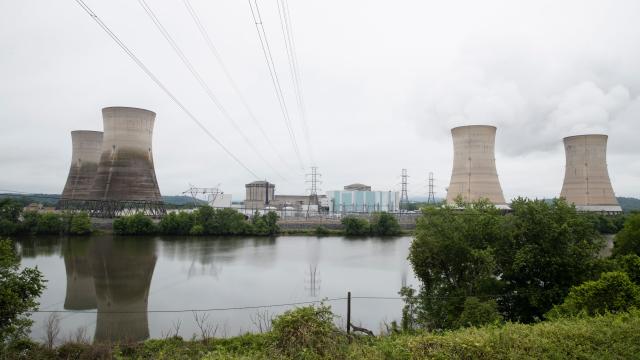The last remaining reactor in operation at Pennsylvania’s Three Mile Island nuclear power plant—the site of the most serious nuclear accident in U.S. history in 1979 — is set to close by Sept. 30, 2019, NPR reported on Wednesday.
Generating Station Unit 1, which was not involved in the infamous partial meltdown of reactor number 2 and a subsequent radiation leak 40 years ago, is still up and running and licensed to operate until 2034. However, the plant’s operator Exelon said in a statement on Wednesday that the money-losing facility is no longer tenable following a failure to obtain subsidies from the Pennsylvania legislature.
Those subsidies, NPR reported earlier this year, were touted by the company as a way to preserve a source of carbon-free power in the age of climate change.
NPR wrote that the failure to obtain said subsidies had at least something to do with the state’s natural gas lobby, which sought to portray it as a bailout:
[The carbon-free power] argument has worked in other states, including Connecticut, Illinois, New Jersey and New York. But in Pennsylvania, the state’s powerful natural gas industry opposed it, along with industrial users and consumer advocates, calling the proposal a “bailout”.
When it became clear the subsidy legislation wouldn’t pass within the next month Exelon decided to retire the plant, which was licensed to operate for 15 more years.
According to NPR, Exelon said it would offer new positions to the hundreds of permanent staff on site who were willing to relocate, though the facility “also employed thousands of contract workers during refuelling and maintenance outages” who will be out of work.
“Today is a difficult day for our employees, who were hopeful that state policymakers would support valuing carbon-free nuclear energy the same way they value other forms of clean energy in time to save TMI from a premature closure,” Exelon senior vice president and chief nuclear officer Bryan Hanson wrote in the statement.
The 1979 incident was the product of a dizzying array of human error, miscommunications, equipment failures, and mistakes in the plant’s design. A coolant pump failure led to reactor number 2 rapidly heating, and the situation got dramatically worse when operators (partially misled by a poorly designed control interface) mistakenly cut off emergency coolant. Residual heat from fission occurring in the core continued to build despite a reactor shutdown, and radioactive materials were released on the grounds of the plant.
A meltdown was ultimately avoided with less than an hour to spare, though public panic and voluntary evacuations ensued, with lasting damage to the U.S. nuclear industry. Critics have alleged that instruments did not accurately capture how much radiation was released, though the Nuclear Regulatory Commission’s official position is that it was not enough to have any health impacts on the general public.
Exelon does not own the reactor involved in the 1979 incident—it was long ago dealt with via a $1 billion, 14-year cleanup effort that entailed removing radioactive fuel and water as well as encasing the reactor in concrete.
(The cleanup also saw some of the first efforts to develop robots that could be used in the aftermath of nuclear disasters.)
According to the Times, the company said Generating Station Unit 1 would require around $1.2 billion to decommission. As with its unfortunate predecessor, the new decommissioning effort will take a lengthy amount of time and create a slew of radioactive waste to deal with, the Times wrote:
After the shutdown on Three Mile Island, fuel — the radioactive material generating heat inside of the nuclear reactor — will be moved into a pool of water. A few years after that, the fuel will be moved into dry storage, where it could stay indefinitely or until the federal government takes ownership of the material.
The facility itself will be given decades to cool down, until it is safe for people to dismantle the structures. Exelon estimates that the plan to dismantle large components won’t begin until 2074.
Nuclear power plants provide around 20 per cent of the nation’s electricity, and around 50 per cent of its carbon-free electricity, and the continued decline of the industry has come up as a major talking point in the debate over the U.S.’s carbon footprint. Several other plants have shut down in recent years.
$36 billion.
